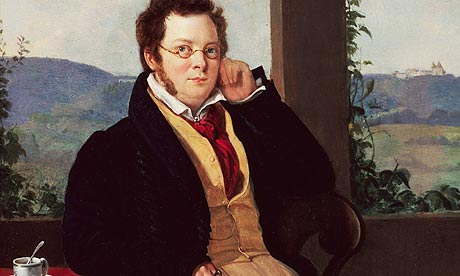
To escape the endless parade of Gordon Brown's bigot-gate today, I've been hacking my way through Schubert's piano sonatas. And one of them, in particular, has been the bane of my neighbours' lives: a piece of infinite expressive darkness and austerity – and that's not just the appalling approximate-ness of my playing, either. It's the one in A minor, D784, which you only rarely hear in concert.
Even for Schubert, this sonata is extreme. The whole first movement is a skeleton of a sonata-form allegro, with bare bones of harmony and rhythm instead of themes and melodies. There are none of the conventional, comforting ornamental surfaces of early 19th-century music to disguise the brutal changes from one key to another, or from one chromatic chord to the next. It's music that is deliberately stripped-down and essential, and there's nothing like it that I can think of by way of precedent. It's even more severe in its textures and harmonic daring than any of Schubert's later sonatas. Indeed, this A minor sonata is such a shocking object, it forces you to look for clues as to what might have forced the composer to confront and create its blasted emotional terrain. I found one explanation in a revelatory new book by the doyenne of Schubert scholars, Elizabeth Norman McKay, Schubert: The Piano and Dark Keys.
"Towards the end of 1822 ... Schubert was very sick, having contracted the syphilis that inevitably was to effect the remainder of his life: his physical and mental health, and the music he was to compose. After the initial weeks of debilitating illness – including, it seems, the entire month of January – he took up his pen again in February, and wrote the three-movement piano sonata in A minor, D784. He was sick, living in his father's home, much in need of money, and shattered by what had happened to him. During the composition of this sonata, Schubert's physical and emotional state could hardly have been worse. This tragic A-minor sonata is a deeply personal work, and thus a landmark among his compositions. In composing it, he may have fulfilled his personal needs at the time; but such a sonata was unlikely to excite the enthusiasm of Viennese publishers. Indeed, it was not published until 1839."
Listen to Maria João Pires playing it here – or better still, try the music's tragic trajectory yourself. Here's the first page to get you started, including music in the last couple of lines that McKay describes as a "low-pitched fortissimo bass line [that] suggests a horrific death knell or approaching fate". Just try to get that image of Gordon's head in his hands out of your mind when you're playing it.

